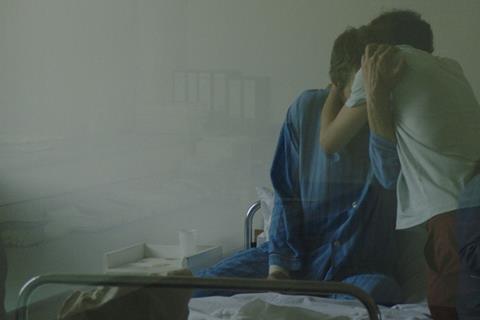Croatian filmmaker Juraj Lerotic makes a promising feature debut with this prize-winning exploration of brotherhood

Dir/scr: Juraj Lerotic. Croatia. 2022. 102 mins.
The bonds of brothers are claustrophically evoked in Safe Place, a prickly and unsettling feature debut from Croatian writer-director Juraj Lerotic. Starring Lerotic himself as worrywart, motormouth fortyish Bruno, who over the course of a day tries to save his depressed younger sibling Damir (Goran Markovic) from suicidal tendencies, the picture launched in the ‘Filmmakers Of The Present’ section at Locarno, followed a few days later by a slot in the main competition at Sarajevo.
Markovic underplays beautifully as the bearded, bear-like, quietly tormented Damir
Locarno juries responded warmly, naming Lerotic as Best Director in his sidebar and Markovic as Best Actor; the film itself landed the top prize from the jury assessing debut features across the entire festival. Such a haul portends a healthy festival career for this low-budget, intimate affair, welcome signal of new talent from a country which has punched a little below its weight cinematically since independence in 1991.
There is a notable mini-wave of skilled Croatian writer-directors born in the 1980s, among them Igor Bezinovic (A Brief Excursion), Hana Jusic (Quit Staring At My Plate), Sonja Tarokic (The Classroom) and Josip Lukic (White Christmas). Lerotic, born in 1978, is older than all of these compatriots; surprisingly, his sole previous directorial credit is 2010 short Then I See Tanja, which picked up a couple of awards at Croatian festivals. Despite his relative seniority, however, Lerotic is still some way from the finished article — attempting writing, directing and lead-acting duties here yields variable results.
His obvious strength lies in direction: in tandem with experienced cinematographer Marko Brdar (whose dozens of credits stretch back to 2006), he consistently finds strong angles and compositions which render Safe Place a compelling visual experience, even when his screenplay’s impact flags or lapses into repetitiveness. Interiors make effective use of shadows, reflections, obstructions, doorways and corridors; exterior shots boost the appeal of notionally drab-looking Croatian residential areas with intelligent organisation of geometric shapes and organic greenery within the frame.
The basic story is quite simple, beginning with Bruno breaking down the door of Damir’s flat and finding his brother suffering from severe self-inflicted injuries. Damir is taken to hospital and placed in a room to rest; at this point the film executes a bold and risky left-field gambit. The restroom appears weirdly bare and underlit; as Bruno and Damir talk, it transpires that Damir has in fact died, and the scene is part of a therapeutic fictional restaging by filmmaker Bruno. “You can only say the lines I write for you to say,” he informs his brother.
This “meta” touch of Brechtian distancing serves to instantly diminish the film’s stakes, and narrative momentum takes a long time to recover. Leaving aside such Pirandellian flourishes, Lerotic shifts back to conventional storytelling for the remainder, in which Damir is again among the living. The action later moves to the brothers’ seaside hometown of Split — this setting amplifies the film’s stylistic echoes of Split-native Lukic’s acclaimed, dialogue-heavy shorts. Here, amid the anguished concern of Bruno and his mother (Snjezana Sinovcic Siskov), Damir will make two more suicide attempts.
If the trio of Locarno gongs was perhaps a trifle generous for such a promising if flawed enterprise, the award for Markovic cannot be seriously questioned. In effective contrast to the hyperactive and somewhat grating Lerotic, Markovic underplays beautifully as the bearded, bear-like, quietly tormented Damir. Lerotic would, however, have benefited from casting another performer in the crucial role of Bruno, as his own thespian talents are not quite up to the challenge.
In a film where institutional bureaucracy and intransigence is a recurring, darkly comic element — shades of Cristi Puiu and other Romanian New Wave eminences — casting directors Nevenka Sablic and Oriana Kuncic fill myriad minor roles with entirely believable character-players. This adds crucial texture and verisimilitude to a project which, at times, flirts dangerously with tricksy metafictional clever-cleverness, at the expense of emotional impact.
Production companies: Pipser, Zelena zraka
International sales: Pipser, miljenka.cogelja@gmail.com
Producer: Miljenka Cogelja
Cinematography: Marko Brdar
Production design: Jana Plecas
Editing: Marko Ferkovic
Main cast: Juraj Lerotic, Goran Markovic, Snjezana Sinovcic Siskov






![The Brightest SunScreen[Courtesy HKIFF]](https://d1nslcd7m2225b.cloudfront.net/Pictures/274x183/3/5/0/1448350_thebrightestsunscreencourtesyhkiff_312678.jpg)















![The Brightest SunScreen[Courtesy HKIFF]](https://d1nslcd7m2225b.cloudfront.net/Pictures/100x67/3/5/0/1448350_thebrightestsunscreencourtesyhkiff_312678.jpg)

